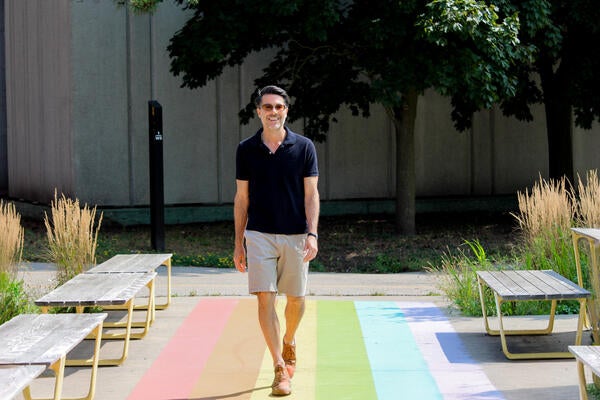
Researchers seek children with attention-deficit hyperactivity disorder
University of Waterloo researchers are seeking local area children aged six to 12 with attention-deficit hyperactivity disorder (ADHD) to participate in a major study

University of Waterloo researchers are seeking local area children aged six to 12 with attention-deficit hyperactivity disorder (ADHD) to participate in a major study
By Media RelationsWATERLOO, Ont. (Monday, Jan. 17, 2011) - University of Waterloo researchers are seeking local area children aged six to 12 with attention-deficit hyperactivity disorder (ADHD) to participate in a major study investigating the communicative difficulties that often co-occur with the disorder.
Individuals diagnosed with ADHD experience inappropriate degrees of inattention, impulsiveness and hyperactivity that lead to difficulties in many aspects of daily life. Also, the interpersonal struggles faced by children with ADHD can be one of the most challenging aspects of the disorder.
"Many children have trouble focusing and regulating their behaviour from time to time," said psychology professor Elizabeth Nilsen, director of the cognitive development laboratory in the Centre for Mental Health Research at uWaterloo. "However, some children experience these problems more frequently and do not 'grow out' of these behaviours resulting in difficulties at home, at school and with friends. Children who persistently struggle with these challenges are often diagnosed with ADHD."
In Ontario, nine per cent of boys and three per cent of girls are estimated to have ADHD. Fifty to 80 per cent of these diagnosed children continue to struggle with the disorder into their adult lives.
Nilsen, who studies cognitive development in the preschool and school years, said that communication is one facet of daily life that can be affected by ADHD.
"Many children and adults with ADHD frequently struggle to communicate effectively with others and as a consequence, experience numerous difficulties in their interpersonal relationships."
While it's not yet known what causes communication difficulties in individuals with ADHD, uWaterloo researchers aim to find out. They are probing the communicative and interpersonal challenges associated with ADHD.
"Successful communication is a remarkably involved process, requiring communicators to simultaneously track social, linguistic and contextual information, while rapidly managing the flow of this information between themselves and their conversational partners," said Nilsen, who has a special interest in children's communication skills.
The uWaterloo researchers investigate whether the cognitive demands involved in communicating pose a greater challenge for children with ADHD than for their same-aged peers.
The studies will be structured like games so that children can have fun while helping researchers answer important questions about child development. During their visit to the cognitive development laboratory, parents are able to view their children at all times and will be provided with ample opportunity to ask questions.
The cognitive development laboratory draws together researchers and psychology students whose work involves communication and language development.
The ADHD communication study, funded by a grant from the Ontario Mental Health Foundation, is being co-ordinated by Nilsen, who investigates the developmental course of communicative behaviours underlying cognitive skills necessary for children to successfully navigate their social world.
She is assisted by research co-ordinator Agnieszka Fecica, who holds a PhD in psychology and is an expert in cognitive and language development. Fecica investigates children's language and perspective-taking skills in the preschool and school years.
The cognitive development laboratory is currently recruiting children between the ages of six and 12 from the community who have been diagnosed with ADHD and are willing to participate in a study. The lab is primarily research-oriented and does not conduct clinical assessments.
Parents interested in having their children participate in the research can contact the uWaterloo researchers (all inquiries are confidential) by the following means:
* Phone: 519-888-4567 ext. 38542 (confidential voicemail)
* Email: childresearch@uwaterloo.ca
Website: cognitivedevelopmentlab.uwaterloo.ca/
All studies conducted by the cognitive development laboratory have been reviewed and received ethics clearance through uWaterloo's office of research ethics.
About Waterloo
The University of Waterloo, located at the heart of Canada's Technology Triangle, is one of Canada's leading comprehensive universities. Waterloo is home to 30,000 full- and part-time undergraduate and graduate students who are dedicated to making the future better and brighter. Waterloo, known for the largest post- secondary co-operative education program in the world, supports enterprising partnerships in learning, research and discovery. For more information about Waterloo, visit www.uwaterloo.ca.

Read more
Brian Orend brings a philosopher’s perspective on happiness, navigating the challenges of chronic illness through connection to ourselves and others

Read more
With the support of the Lupina Foundation, postdoctoral scholars in Arts are improving healthcare

Read more
Doctoral candidate considers how the humanities' rich tradition of storytelling and character exploration can be harnessed to shape the future of AI
The University of Waterloo acknowledges that much of our work takes place on the traditional territory of the Neutral, Anishinaabeg, and Haudenosaunee peoples. Our main campus is situated on the Haldimand Tract, the land granted to the Six Nations that includes six miles on each side of the Grand River. Our active work toward reconciliation takes place across our campuses through research, learning, teaching, and community building, and is co-ordinated within the Office of Indigenous Relations.